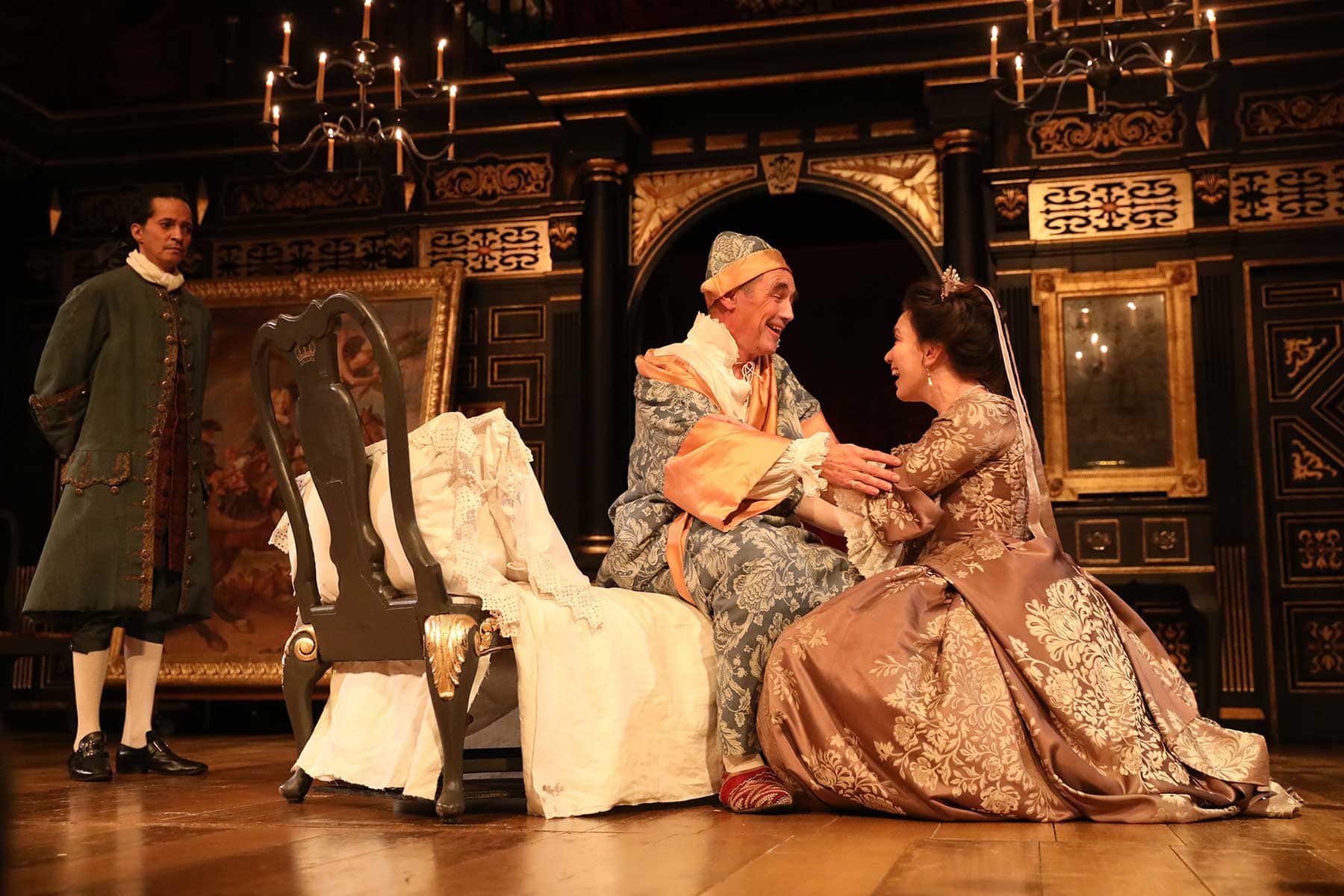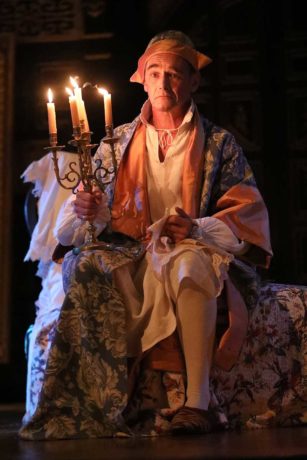I believe there’s a reason the name of the countertenor Farinelli precedes that of King Philippe V of Spain in the title of the play running currently at the Belasco Theatre on Broadway. Unlike The King and I, in which the monarch takes an emotional journey with a lady who has been employed to teach his children, Farinelli is the gent with the velvet voice who is the one person in his life who can calm Philippe. The king is the semi-psychotic grandson of Louis XIV of France, and his giant headaches and bi-polar behavior drive him close to the edge of insanity. With Farinelli in residence to soothe through song, the king manages a reign of over fifty years.

In this production of the play by Claire van Kempen, Sam Crane is the elegant actor who plays Farinelli whenever he speaks, but it is Iestyn Davies and James Hall who alternate as the same character when he sings the glorious songs of composer George Frideric Handel, the German-born composer who spent most of his life in England, where he composed operas, oratorios, anthems, and organ concertos. It was Mr. Davies at the performance I attended on Wednesday night, and his incredibly beautiful voice filled the candle-lit stage with a sound so magical it could calm the breast of a savage beast.
The nearest we had to one was King Philippe, and as he was played by the incomparable Mark Rylance. It was absolutely thrilling to watch the transformation that brought him down from uncontrollable rage to blissful contentment. These two, the king and the singer, exchange roles, with the singer in full control of the king. Farinelli holds so much control, in fact, that when he threatens to leave the kingdom, his majesty threatens to kill himself, and he prevails in keeping the singer in his court where he remained for over nine years.

The play is based loosely on historically accurate characters who lived in the first half of the eighteenth century (Philippe died in 1746). Ms. van Kampen is internationally renowned as an academic, lecturer, performer, and composer. Farinelli marks her debut as a playwright, and she is less concerned with plot and structure than she is with characterization and incident to clue us into the intimate relationship her two protagonists enjoy. The king’s loyal second wife Isabella Farnese; his doctor, Dr. José Cervi; and others who surround him all make occasional contact with him, but it’s with fascination that we listen to Farinelli and watch Mr. Rylance as the King reacts to what he hears.
Another contribution is made by Sam Crane (Farinelli whenever he speaks), who must stand in the shadows behind Iestyn Davies whenever music is in the air, and we accept the concept immediately. The actors resemble each other, which helps. But more importantly, they truly appear to be two parts of the same human being.
Visually the production could not be more exemplary. Candles (live ones for the most part, but all the electrics look real, too) bring muted light to the evening, but Paul Russell’s lighting design subtly shifts as needed to focus on the needs of the moment. Jonathan Fensom has designed the set to include the audience, some of whom sit on stage, which dramatizes the concept that we are part of the picture. And that allows the actors to mix and mingle with us, and Mr. Rylance to treat us as members of his court. The staging is vivid and inventive always under the guidance of director John Dove.
This is in every way an exemplary visit for us to Shakespeare’s Globe in London where it had great success before crossing the ocean to delight us as well. It’s not for those looking for more conventional structure or more contemporary problems. There will be those who will see comparisons to our own world, the one in which we live with a leader who would seem not to reach out to the arts to keep things calm. But for those who enjoy boarding a flying carpet to take them to a time and place with which we may have little connection, other than fellow human beings seeking a peaceful passage through the one life they have at their disposal, I’m certain they will be happy to sign on for the ride.
Running Time: Two hours and 30 minutes with one 15-minute intermission.
Farinelli and the King plays through March 25, 2018, at the Belasco Theatre – 111 West 44th Street, in New York, NY. For tickets, call (800) 432-7250 or go online.




